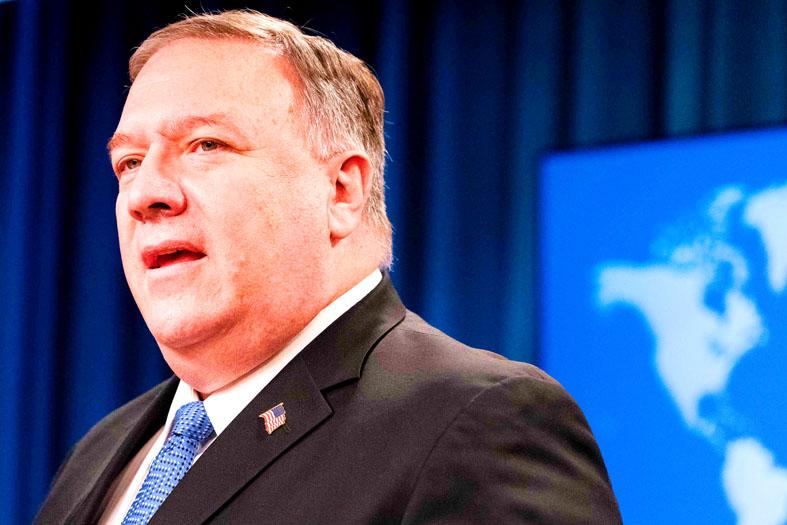The government yesterday welcomed a statement by US Secretary of State Mike Pompeo that “Taiwan has not been a part of China,” saying that the two sides of the Taiwan Strait should maintain the “status quo” based on equal dignity.
During a telephone interview with the Hugh Hewitt Show radio program aired on Thursday, Pompeo was asked to comment on the US’ commitments to Taiwan’s security and the opinions of radical elements of the Chinese Communist Party that Taiwan should be “retaken by force if necessary.”
In response, Pompeo said it was important to “get the language right.”

Photo: AFP
“Taiwan has not been a part of China, and that was recognized with the work that the [former US president Ronald] Reagan administration did to lay out the policies that the United States has adhered to now for three-and-a-half decades, and done so under both administrations,” he said, referring to Reagan’s “six assurances” made to Taipei in 1982.
“I actually think this is in fact bipartisan. I think the central understandings that this is a model for democracy that the people who live on Taiwan ought to be honored by having the Chinese live up to the commitments that they have made — I think this is something that both parties can agree to,” he said.
“You’ve seen our announcements with respect to weapon sales to Taiwan to assist in their defense capabilities. All of these things are designed to live up to the promises that have been made between, frankly, China and the Taiwanese people,” he added.
Pompeo also highlighted the importance of the Quadrilateral Security Dialogue among the US, Australia, India and Japan, saying that it would build a set of common understandings that deliver increased security in the region for travel and navigation.
In Taipei, Presidential Office spokesman Xavier Chang (張惇涵) said in a statement yesterday that it is an indisputable fact that the Republic of China is a sovereign state of 23 million Taiwanese who love freedom and democracy, and are glad to make contributions to the global community.
Both sides of the Strait should, based on the principle of equal dignity, jointly maintain the peaceful and stable “status quo” across the Strait, he said.
Taiwan would continue to fulfill its international obligations, making positive contributions to cross-strait and regional peace, stability and prosperity, he said.
“The Republic of China is a sovereign state, not part of the People’s Republic of China, which is a fact as well as the status quo,” Ministry of Foreign Affairs spokeswoman Joanne Ou (歐江安) said in a separate statement, thanking Pompeo for his support.
The Chinese Ministry of Foreign Affairs said that China would strike back against any moves that undermine its core interests.
Speaking in Beijing, Chinese Ministry of Foreign Affairs spokesman Wang Wenbin (汪文斌) said that Taiwan was an inalienable part of China and that Pompeo was further damaging US-China ties.
“We solemnly tell Pompeo and his ilk, that any behavior that undermines China’s core interests and interferes with China’s domestic affairs will be met with a resolute counterattack by China,” he said, without elaborating.
Additional reporting by Reuters

‘WIN-WIN’: The Philippines, and central and eastern European countries are important potential drone cooperation partners, Minister of Foreign Affairs Lin Chia-lung said Minister of Foreign Affairs Lin Chia-lung (林佳龍) in an interview published yesterday confirmed that there are joint ventures between Taiwan and Poland in the drone industry. Lin made the remark in an exclusive interview with the Chinese-language Liberty Times (the Taipei Times’ sister paper). The government-backed Taiwan Excellence Drone International Business Opportunities Alliance and the Polish Chamber of Unmanned Systems on Wednesday last week signed a memorandum of understanding in Poland to develop a “non-China” supply chain for drones and work together on key technologies. Asked if Taiwan prioritized Poland among central and eastern European countries in drone collaboration, Lin

The Chien Feng IV (勁蜂, Mighty Hornet) loitering munition is on track to enter flight tests next month in connection with potential adoption by Taiwanese and US armed forces, a government source said yesterday. The kamikaze drone, which boasts a range of 1,000km, debuted at the Taipei Aerospace and Defense Technology Exhibition in September, the official said on condition of anonymity. The Chungshan Institute of Science and Technology and US-based Kratos Defense jointly developed the platform by leveraging the engine and airframe of the latter’s MQM-178 Firejet target drone, they said. The uncrewed aerial vehicle is designed to utilize an artificial intelligence computer

The US government has signed defense cooperation agreements with Japan and the Philippines to boost the deterrence capabilities of countries in the first island chain, a report by the National Security Bureau (NSB) showed. The main countries on the first island chain include the two nations and Taiwan. The bureau is to present the report at a meeting of the legislature’s Foreign Affairs and National Defense Committee tomorrow. The US military has deployed Typhon missile systems to Japan’s Yamaguchi Prefecture and Zambales province in the Philippines during their joint military exercises. It has also installed NMESIS anti-ship systems in Japan’s Okinawa

Renewed border fighting between Thailand and Cambodia showed no signs of abating yesterday, leaving hundreds of thousands of displaced people in both countries living in strained conditions as more flooded into temporary shelters. Reporters on the Thai side of the border heard sounds of outgoing, indirect fire yesterday. About 400,000 people have been evacuated from affected areas in Thailand and about 700 schools closed while fighting was ongoing in four border provinces, said Thai Rear Admiral Surasant Kongsiri, a spokesman for the military. Cambodia evacuated more than 127,000 villagers and closed hundreds of schools, the Thai Ministry of Defense said. Thailand’s military announced that